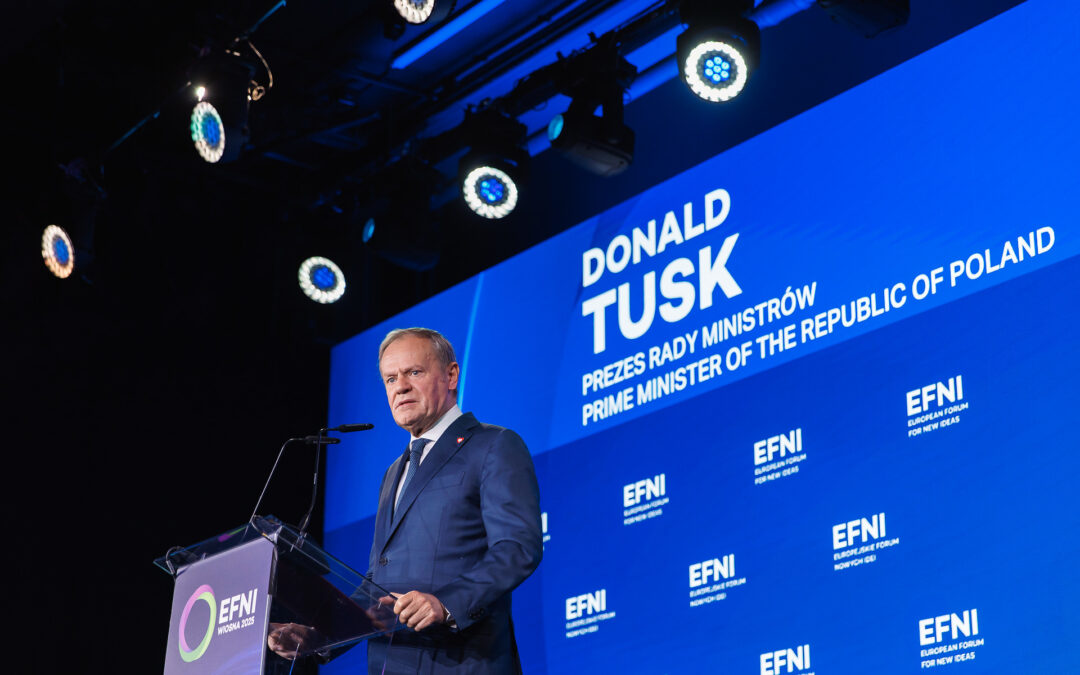Keep our news free from ads and paywalls by making a donation to support our work!

Notes from Poland is run by a small editorial team and is published by an independent, non-profit foundation that is funded through donations from our readers. We cannot do what we do without your support.
Prime Minister Donald Tusk has called for stronger national control over Poland’s economy, advocating for the “repolonisation” of the Polish market and capital and declaring an end to what he called the era of “naive globalisation”.
Speaking at the European Forum for New Ideas (EFNI), Tusk said Poland must learn from global challenges to stay competitive and secure. He offered several examples of how the government intends to support Polish state companies and strengthen national economic resilience.
Tusk argued that Poland could no longer act as a “naive partner” in an increasingly aggressive global economy. “Polish companies will not stand in a lost position in competition with international giants,” he said, as quoted by broadcaster TVN24.
📰 KOMUNIKAT | Kończy się era naiwnej globalizacji. To rok przełomu dla polskiej gospodarki. Premier Donald Tusk podczas otwarcia Europejskiego Forum Nowych Idei zapowiedział nową strategię gospodarczą państwa – aktywną, jednoznaczną i wspierającą polski kapitał.
— Centrum Informacyjne Rządu (@KPRM_CIR) April 15, 2025
Tusk said he takes responsibility for the “brutal message” from today’s economic reality. “It is time to rebuild the national economy. It is time to repolonise the Polish economy, market, capital,” he declared.
The prime minister outlined a broad agenda for economic realignment, tasking the state, managers and public institutions with safeguarding national economic interests.
“Our task today – and this is a task for the state, for managers, for officials, for ministers, for Polish companies… is to act effectively, when necessary ruthlessly, and always in the interests of Polish entrepreneurs, Polish companies, Polish capital,” he said.
Two more weeks to save @notesfrompoland!
We're halfway through our campaign and we've received 300 donations from our readers. Thank you for the generous support!
But to continue our work we still need your help. Click below to learn more https://t.co/0gVkMlaA0W
— Notes from Poland 🇵🇱 (@notesfrompoland) April 15, 2025
He cited a recent meeting with executives from Poland’s largest state-owned energy companies, where he said the economic dilemmas facing the country were laid bare. He underlined that public ownership must prioritise national interest over profit.
“The first task, for example, in the case of an energy company, is to provide the Polish state with energy security, [to provide] Polish families, Polish households and Polish entrepreneurs with energy that is as cheap as possible and universally available. Not necessarily to maximise the profit of the state company,” Tusk said.
Stressing the importance of national identity in economic strategy, Tusk called for a greater role for Polish firms in public procurement and pledged stricter oversight of state-owned companies to guarantee local participation.
“We must take care of the interests of Polish entrepreneurs in a ruthless and selfish manner,” he said.
The prime minister’s remarks triggered a negative market reaction, with energy company shares falling sharply. PGE dropped 6.6%, Enea fell 3.5% and Tauron declined 8.5%. Orlen also saw a slight dip. All four companies are state-owned.
🔻TAURON -8,5%
🔻PGE -6,6%
🔻ENEA -3,5%%==> https://t.co/8dOvqKHGQa pic.twitter.com/JpnHpHhxG3
— Strefa Inwestorów (@strefainw) April 15, 2025
Tusk also pointed to key investment areas where domestic firms would be favoured, including the expansion of the Sławków terminal – a cargo hub linking eastern broad-gauge rail with the European network – and the construction of Poland’s first nuclear power plant in Choczewo.
He said the government had made an “irrevocable” decision that 53 billion zloty (€12.37 billion) from the nuclear plant project must go directly to Polish companies. While some high-tech components would still require foreign partners, these would remain limited.
Poland cannot legally prioritise domestic firms solely based on nationality under EU competition and procurement rules. However, the government may promote local participation through quality requirements and subcontractor quotas.
The main contractor, US-based Westinghouse, has said that up to 50% of the Choczewo project will involve Polish companies.
The government says it has negotiated a new agreement with a US consortium to continue developing Poland’s first nuclear plant.
It insists that, despite the previous contract expiring and the new one not yet being signed, work will go on as scheduled https://t.co/SUwm1Bcymq
— Notes from Poland 🇵🇱 (@notesfrompoland) April 2, 2025
Rebuilding the country’s industrial capacity is also among investment priorities, said Tusk.
He cited Rafako – a boiler manufacturer that declared bankruptcy last year – as an example of how the state can effectively support industry, proposing that the company’s potential be used for armaments production.
Tusk also cited the example of Huta Częstochowa, which, he says, was saved thanks to the state’s commitment and has become an important element in supporting the Polish army.
Poland's manufacturing sector showed signs of recovery in February, with its purchasing managers’ index (PMI), a key gauge of economic activity, rising above 50 (indicating growth rather than contraction) for the first time in nearly three years https://t.co/sqjtbOnG9x
— Notes from Poland 🇵🇱 (@notesfrompoland) March 5, 2025
Tusk’s emphasis on prioritising national interests in economic policy echoes language employed by the previous Law and Justice (PiS) government. Under PiS, the state sought to bring key sectors of the economy under domestic ownership, framing the moves as necessary to protect national sovereignty.
That included Orlen’s 2020 acquisition of hundreds of regional media outlets from a German company, a move PiS defended as a safeguard against foreign influence but which critics described as an attempt to increase government control over the media.
The PiS administration also floated ideas like launching a state-owned grocery chain and expressed interest in buying back major private assets like the Żabka convenience store network.
"We are moving in the direction" of "buying back" Poland's largest convenience store chain, Żabka, from its foreign owners, says Jarosław Kaczyński.
It is "our task to return the most strategic parts of our economy from the hands of external capital" https://t.co/yG62W4VGZx
— Notes from Poland 🇵🇱 (@notesfrompoland) October 13, 2022

Notes from Poland is run by a small editorial team and published by an independent, non-profit foundation that is funded through donations from our readers. We cannot do what we do without your support.
Main image credit: Kancelaria Premiera / flickr.com (CC BY-NC-ND 2.0)

Alicja Ptak is deputy editor-in-chief of Notes from Poland and a multimedia journalist. She has written for Clean Energy Wire and The Times, and she hosts her own podcast, The Warsaw Wire, on Poland’s economy and energy sector. She previously worked for Reuters.



















